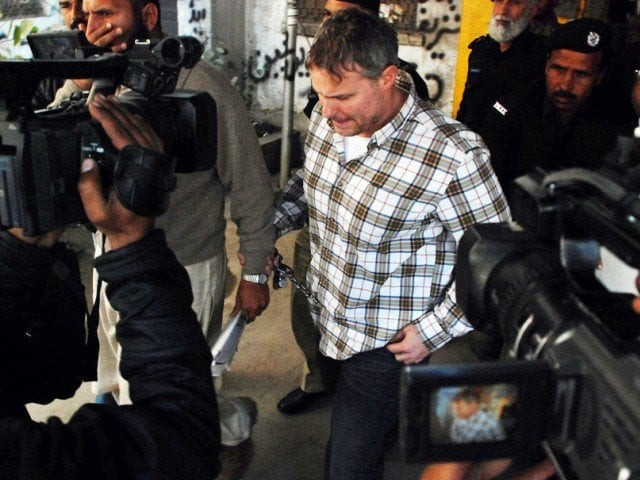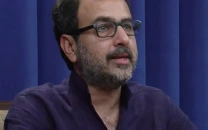The players named in the Raymond Davis episode must come clear
The policy of secret deals with powerful nations needs to be revised

Former politicians and officials, who Davis claims in his book helped provide him with a safe passage, should break their silence. PHOTO: Reuters
Hired as a private contractor by the US Central Intelligence Agency (CIA), Davis was arrested in 2011 after shooting down two men (Faizan Haider and Faheem Shamshad) in Lahore in what he claimed was an act of self-defence during an attempted robbery. In the same year in March, Davis was released by a Lahore Sessions Court after spending 48 days in detention. The CIA contractor had to pay Rs200 million as blood money to the heirs of the deceased and Rs20,000 in fine for carrying an illegal weapon.
Raymond Davis case: Men killed in Lahore were intelligence operatives, says official
His book titled ‘The Contractor: How I Landed in a Pakistani Prison and Ignited a Diplomatic Crisis’ claims that his release was made possible after a deal between Islamabad and Washington with no words on the proposals made in the deal. Davis in his book has alleged that the then Inter-Services Intelligence chief Ahmad Shuja Pasha, the then CIA director Leon Panetta and Pakistan’s political leadership, as well as the judiciary, assisted in his acquittal.
The book offers nothing new. Just like the personality of Davis, his book too is shrouded in mystery for several reasons.
One would wonder why the book was made public after a gap of seven years when Pakistan is going through a political crisis. It failed to give any details of the CIA’s mission, its objective and the number of operatives or its network in Pakistan.
It also does not inform the readers much about the Davis' actual task in Pakistan. What did the US actually offer to Pakistan in the deal? What happened to the CIA operatives in Pakistan as it is believed that the CIA had to wind up its operation in the country amid the deal? All such questions remain unanswered. There is no way of verifying Davis’ claims in the book as it is difficult to ascertain their authenticity.
Conspiracy theories
Davis remained a controversial figure from the very beginning. When the reports of him shooting down two men in Lahore emerged in 2011, the US came to his rescue saying that he enjoyed diplomatic status.
However, the then foreign minister, Shah Mehmood Qureshi, who later resigned over Davis’ case, had denied that he was a diplomat.
Davis was also accused of visiting Peshawar and Federally Administered Tribal Areas (Fata) and taking pictures of sensitive areas of Pakistan. Why was Davis even sent to Pakistan is still unknown.
Raymond Davis saga: Victims' families leave country say sources
Initially, his narration about the circumstances that made him kill the two men was contradicted by police. His release was also controversial as the relatives of deceased were reportedly forced into reconciliation. Moreover, top US officials including former US secretary of state Hillary Clinton were also fully engaged in the efforts to rescue Davis. Some media reports also suggested that Panetta had met with Pakistani officials while the case was being heard.
The history of mistrust between Islamabad and Washington is not clandestine. In such a situation, the spreading of widespread rumours and conspiracy theories makes sense. A segment of the society, with some experts on board, believe that Davis’ book has been released when the political temperature in Pakistan is high and the China-Pakistan Economic Corridor (CPEC) project is nearing its success. "At a time when Pakistan is trying to strengthen its ties with China and Russia, such claims are apparently aimed at destabilising the country,” an official said on the condition of anonymity.
National interest
It is debatable whether punishing Davis, back in 2011, was in the national interest or, for that matter, his release was. Washington’s engagements in the entire region, particularly, in Afghanistan are important. However, many believe that a number of factors might have forced the Pakistani government to provide Davis with a safe passage and legal cover.
Diplomat or not, Davis departs
Definitely, relations with super powers including the US are important for Pakistan. Islamabad is also greatly dependent on the US technology for matters related to defence. After 9/11, the ties between the intelligence agencies of the two countries were being considered fundamental for stability in the region. Pakistan and the US also work as allies on critical issues including counter-terrorism. For the last couple of years, Pakistan has been pushing Washington to adopt a balanced approach in South Asia instead of tilting more towards India – fearing a disturbance of power in the region.
A section of the Pakistani society felt that sentencing Davis was needed for upholding the country’s dignity and now the revelations in his book have further frustrated them.
What’s next?
Although the Davis case has long been closed, former politicians and officials who have been accused in his book of securing his release should break their silence on the issue and clarify their stance. In this connection, the role of media, experts and analysts is also crucial.
The most important lesson to be learnt from the Davis episode should be that the policy of secrecy on highly sensitive and crucial issues must end. Instead, the parliament must be taken into confidence over such matters as mysteries create scepticism in a society and the results are counter-productive.
Reconciliation deals are not supposed to be "enforced". There can be no compromise over national interests but the policy of secret deals with powerful nations that create doubts in our society, already known for harbouring anti-US sentiments, needs to be revised.
Imdad Hussain is an Islamabad-based journalist specialising in diplomatic and security issues.



















COMMENTS
Comments are moderated and generally will be posted if they are on-topic and not abusive.
For more information, please see our Comments FAQ